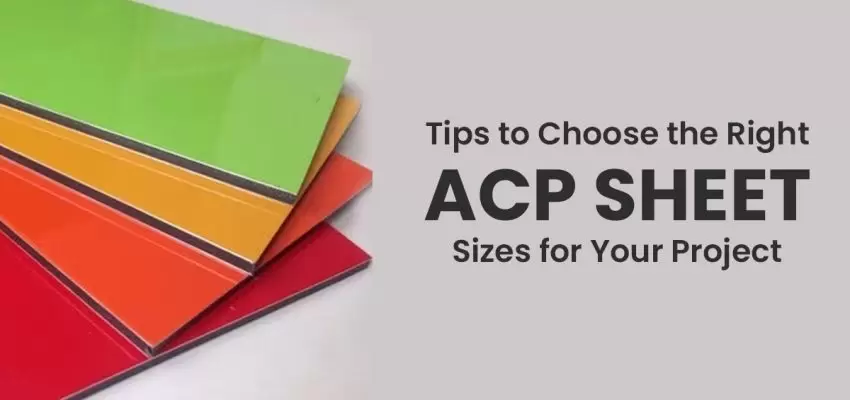Aluminum Composite Panels (ACPs) have become a highly popular wall cladding and facade material in modern buildings. However, selecting the right ACP sheet dimensions is crucial for an efficient installation and visually flawless final outlook. Follow this comprehensive guide to determine the ideal ACP Sheet Sizes for your upcoming construction or renovation project.
Post your Requirement
Weigh Your Project’s Unique Considerations
As a versatile material used across residential, commercial, and industrial projects, ACP sheets come in a diverse range of sizes. Hence, the sizes you choose should align specifically with your project’s unique specifications and requirements.
Here are some key factors to consider:
- Building Type: The scale and needs of a private home differ greatly from a mall or airport. Evaluate whether your project requires smaller customized sheets or standard large format sizes.
- Design Plans: If aiming for a contemporary sleek facade, large ACP sheets with minimal seams deliver visual continuity. For traditional decorated looks, smaller sheets allow intricate detailing.
- Installation Area: Measure surface areas to be covered for a realistic sheet estimate. Calculate odd-shaped sections separately. Planning the layout well is vital.
- Ease of Handling: Consider space constraints around the site and for transportation logistics. Larger sheets become challenging to manually handle and require machinery.
- Budget: Larger or custom ACP sizes have higher per-sheet costs. Weigh expenses against factors like reduced labor for faster installation.
Consult architects to understand aesthetic impacts and engineers regarding structural stability considerations before finalizing sizes.
Evaluate Common ACP Sheet Standard Sizes
For most projects, ACP sheets measuring 3mm to 6mm in total thickness are available from leading manufacturers in set dimensions:
- 1220mm x 2440mm
- 1250mm x 3000mm
- 1500mm x 3000mm
- 1500mm x 4000mm
- 1500mm x 5000mm
These standardized options balance optimization for production, handling, transportation, and installation. The 1500mm width allows for minimizing vertical seams when used for tall structures.
Standard sizes like 1250x3000mm suit many low-rise projects efficiently. For small surfaces under 1000 square feet, opting for the 1220x2440mm size may suffice too.
Consider Custom Options for Unique Needs
While standardized ACP sheet sizes fulfill most building cladding needs, some projects demand more tailored solutions. Custom sheet fabrication allows ACP dimensions to meet niche requirements like unusual installation spaces, decorative pattern matching needs, and very large uninterrupted facades. If standardized ACP sizes would create too many disjointed seams or leave unpleasant gaps, explore customized fabrication. Extra large sheets up to 15 feet wide are also possible. Just ensure to account for increased per-sheet costs and handling infrastructure needs.
Tip: For buildings above 6 floors, consult engineers to establish safe ACP sheet sizes from wind loading perspectives.
Check Supplier Sheeting Options Before Deciding
Always cross-verify the sheet size options available from shortlisted ACP brand distributors and local warehouses before finalizing sizes. Whether opting for standard or custom sheets, ensure your supplier or metal cladding contractor can feasibly source and provide the sheets before making decisions.
It is also wise to verify if suitable lifting equipment, transport vehicles, and trained installation crews will be available to handle large format or heavy custom ACP sheets. Planning such logistics in advance is vital for seamless project execution.
Maximize Efficiency Onsite Through Specialized Handling
To fully gain the advantages of large ACP sheet sizes (whether standardized or custom), the actual installation process must be optimized using proper lifting and securing techniques.
Attempt manual installation strictly for smaller sheets under 1250mm width. For large sheets, utilize special suction lifters, boom cranes, and flatbed trucks to carefully maneuver ACP panels onsite without damage.
Invest in heavy-duty racks, frames, and stands to securely store the fabricated sheets until installation. Follow all fire safety protocols. Using experienced metal cladding crews is critical for safe sheet handling and efficient mounting.
Conclusion
ACP sheet dimensions hold tremendous influence over vital factors like design cohesion, cost efficiency, installation viability, and site safety management. Only proper planning by assessing project needs, verifying supplier capabilities, and optimizing installation logistics will result in successful outcomes.
By following expert guidance to determine the most suitable ACP sheet sizes along with prudent on-site handling protocols, you can actualize stunning facades using these lightweight aluminum panels.
FAQs
Q-1. What factors influence ACP sheet size selection for projects?
A-1. Consider building type, design plans, installation area, ease of handling, and budget to align with project specifications.
Q-2. What are common standard ACP sheet sizes available in the market?
A-2. Standard sizes range from 1220mm x 2440mm to 1500mm x 5000mm, balancing production, handling, and installation optimization.
Q-3. When should one consider custom ACP sheet sizes for a project?
A-3. Opt for custom sizes for unique spaces, intricate detailing, or uninterrupted facades where standard sizes may be impractical.
Q-4. How to calculate the number of ACP sheets required for a project?
A-4. Divide the total facade area by the coverage area of standard sheets, adding 10% for handling damages and cut-offs.
Q-5. What considerations are crucial when checking supplier sheeting options?
A-5. Verify sheet availability with distributors, ensuring logistical support for lifting, transport, and trained installation crews for large or custom sheets.























Post A Comment